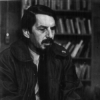Robert Creeley

Robert Creeley
Robert Creeleywas an American poet and author of more than sixty books. He is usually associated with the Black Mountain poets, though his verse aesthetic diverged from that school's. He was close with Charles Olson, Robert Duncan, Allen Ginsberg, John Wieners and Ed Dorn. He served as the Samuel P. Capen Professor of Poetry and the Humanities at State University of New York at Buffalo. In 1991, he joined colleagues Susan Howe, Charles Bernstein, Raymond Federman, Robert Bertholf, and Dennis...
NationalityAmerican
ProfessionPoet
Date of Birth21 May 1926
CountryUnited States of America
My wife and I lived all alone, contention was our only bone. I fought with her, she fought with me, and things went on right merrily. But now I live here by myself with hardly a damn thing on the shelf, and pass my days with little cheer since I have parted from my dear.
I will go to the garden. I will be a romantic. I will sell myself in hell, in heaven also I will be.
No matter how wild reality was obviously often being, it was an absolutely secure place, as a tone and intelligence, and a thing happening.
The Lady has always moved to the next town and you stumble on after Her.
Oh well, I will say here, knowing each man, let you find a good wife too, and love her as hard as you can.
My love's manners in bed are not to be discussed by me
Comes the time when it's later and onto your table the headwaiter puts the bill
My nature is a quagmire of unresolved confessions.
Love, if you love me, lie next to me. Be for me, like rain, the getting out of the tiredness, the fatuousness, the semi- lust of intentional indifference. Be wet with a decent happiness.
There are a lot of editorials that have nothing to do with anything like that. But I was just thinking of that sense of prose as being very responsible and perceptive, thoughtful, intimate, and contriving a quote statement.
Still, no one finally knows what a poet is supposed either to be or to do. Especially in this country, one takes on the job—because all that one does in America is considered a "job"—with no clear sense as to what is required or where one will ultimately be led. In that respect, it is as particular an instance of a "calling" as one might point to. For years I've kept in mind, "Many are called but few are chosen." Even so "called," there were no assurances that one would be answered.
Form is never more than an extension of content.
O love, where are you leading me now?
Suddenly the whole imagination of writing and editorial and newspaper and all these presumptions about who am I reading this, and who else other people may be, and all that, it's so grimly brutal!